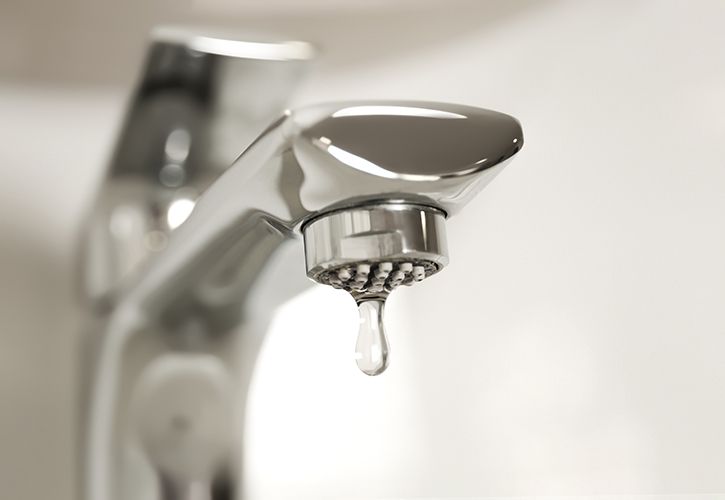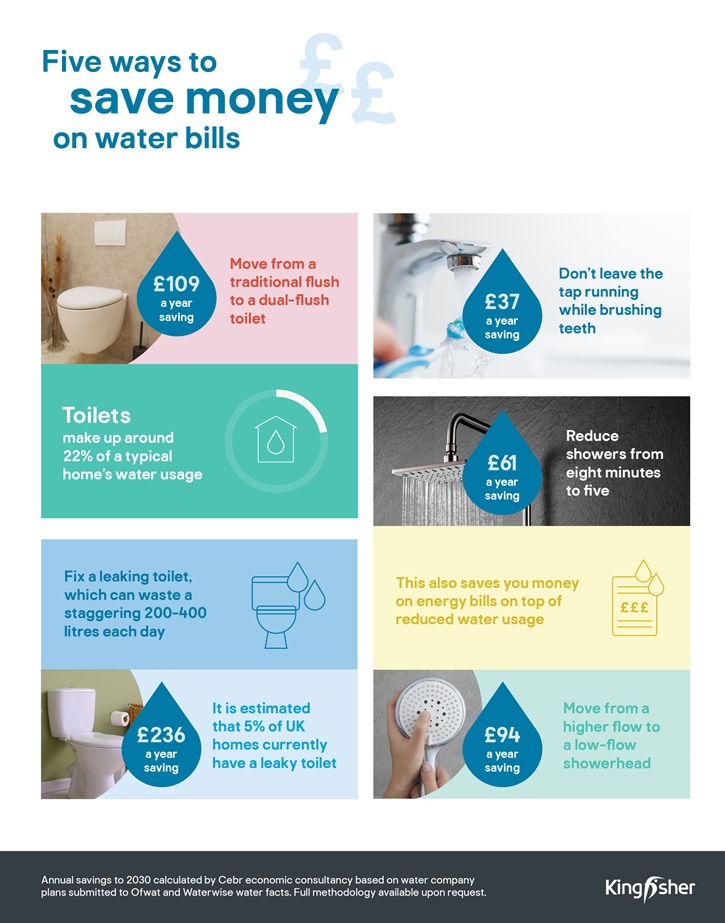UK DIY News
Kingfisher: Water Inefficiency Could Cost Households £300+ A Year

- New economic analysis finds water inefficiency in the home could cost households more than £300/yr, as water companies propose average bill increases of 49% after inflation by 2029/30.
- 72% of Brits say they are worried about looming water bill increases, and 41% wish they had more information about how to save water. Kingfisher experts share ways metered households could offset the proposed bill increases, from £109 p/yr by switching to a dual flush toilet to £94/yr by using a low-flow shower head.
New analysis carried out by the Cebr economics consultancy on behalf of Kingfisher, owner of B&Q and Screwfix, highlights how water inefficiency could cost households over £300/yr over the next five years, based on water companies’ latest proposed bill increases of 49% by 2029/30 after inflation1.
A survey from Kingfisher of 3,000 UK adults2 found that 72% of Brits are worried about the significant increases in water bills expected over the next five years. That is despite them on average expecting an increase of just 16%, significantly lower than those proposed by most water companies.
61% of Brits say that higher bills will make them cut back on their water usage and 81% say saving water is becoming more important. However, 1 in 5 (19%) admit they currently rarely or never think about how much water they are using. 16% say they have little or no idea at all how much their water bill is, with a further 24% only having a vague idea. Over a quarter (26%) say they don’t know whether their billing is metered.
Modelling by Cebr for Kingfisher suggests that by using water more efficiently, metered households (currently c.60% of homes) may be able to completely offset the proposed average increase in bills to 2030. Top potential ways to save money include:
- Moving from a traditional flush to a dual-flush toilet – £109/yr saving3. Toilets alone make up around 22% of a typical home’s water usage.
- Moving from a higher flow to a low-flow showerhead – £94/yr saving (with added energy bill savings, due to reduced hot water usage).
- Reducing showers from eight minutes to five – up to £61/yr saving. Nearly half (45%) of Brits say they shower over six minutes per day, with 1 in 5 (22%) showering longer than ten minutes. Nearly half (49%) admit that they sometimes, often or always shower longer than needed.
- Not leaving the tap running while brushing teeth – £37/yr saving. 1 in 3 Brits (34%) admit they currently do this sometimes or very often.
- Fixing a leaking toilet, which can waste a staggering 200-400 litres each day – £236/yr. It is estimated that 5% of UK homes currently have a leaky toilet.
Kingfisher’s survey found that Brits continue to significantly underestimate their personal water usage. Those who guessed a figure believe they use an average of 49 litres per day, compared to the reality of 140 litres, while 57% said they weren’t sure how much water they used.
Water companies are targeting a fall in water usage to 127 litres per person by 2030. However, according to Cebr’s modelling, usage per person is set to rise to 146 litres per day by 2030 if historic trends continue, without new interventions to promote water efficiency.
Thierry Garnier, Kingfisher CEO, said: “Avoiding water waste isn’t just the right thing to do from an environmental point of view, it’s also a way to save increasingly significant sums of money. By making simple changes in the home and being more conscious about how we all use water, it’s possible to offset the impact of coming bill rises and safeguard this essential resource for the future.”
“Across Europe, climate change is leading to more extreme weather and increasing the risk of water scarcity in many regions. Despite recent high rainfall in the UK, our research last year found that many parts of the country could face water stress over the coming years. Reducing usage is a complex problem, requiring collaboration between Government and industry, and we’re committed to playing our part by making water saving easy and affordable for everyone.”
Over half of Brits (53%) say a significant increase in water bills would make them consider water-saving products for their homes.
Kingfisher’s product development teams have created several innovative Own Exclusive Brand products, engineered to reduce home water usage. The ranges include taps and shower heads with built-in aerators, a feature that has been added without a price increase for customers, while every new toilet now has a 6L/3L dual flush, using significantly less water than a single flush toilet. In the garden, Kingfisher’s Verve products help customers to reduce water waste, for example the Verve water meter counter which helps monitor water consumption, irrigation systems and compost which increases water holding capacity.
Kingfisher’s polling found that nearly half (44%) of Brits wished they had more information on how they can save water. To help, Kingfisher experts have compiled a list of water-saving tips for each part of the home:
Bathroom (68% of water usage) |
|
| Kitchen (22% of water usage) |
|
| Garden/ outdoors (10% of water usage) |
|
 1. Cebr modelling based on Ofwat key facts and data from water company plans, combined with in-house forecasts for inflation. Projected savings and tips based on litres savings stated by Waterwise water facts. Savings calculated as an average annual figure over the five years to 2030, based on projected average household water bills for each year. Full methodology available upon request.
1. Cebr modelling based on Ofwat key facts and data from water company plans, combined with in-house forecasts for inflation. Projected savings and tips based on litres savings stated by Waterwise water facts. Savings calculated as an average annual figure over the five years to 2030, based on projected average household water bills for each year. Full methodology available upon request.
2. Nationally representative survey of 3,000 UK adults carried out by OnePoll between 3rd and 8th May 2024.
3. Kingfisher is proposing five polices for Government to accelerate progress in reducing water usage in the home:
- Prioritise the rollout of water smart meters to as many properties as possible, to give consumers a better understanding of their usage, as well as identify leaks.
- Include information on water efficiency in the consumer facing Energy Performance Certificate. Heating water is second to heating for energy use.
- Collaborate with industry, including retailers, to successfully publicise the 2025 move to mandatory water labelling of relevant products, helping consumers make informed decisions on the best products for their homes.
- Introduce more ambitious water saving regulations in new homes, including defining water usage by fittings installed and not a calculation.
- Incentivise the reuse of water in gardens and internal fittings via water firms, homebuilders, and publicity to tradespeople.
4. In May 2023 Kingfisher and Cebr published research showing seven regions in England could face severe water stress by 2030.
Source : Kingfisher
Image : New Africa / shutterstock.com / 1899478384
Insight provides a host of information I need on many of our company’s largest customers. I use this information regularly with my team, both at a local level as well as with our other international operations. It’s extremely useful when sharing market intelligence information with our corporate office.











































